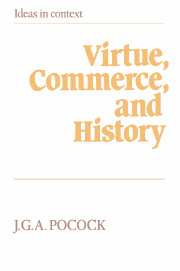 Virtue, Commerce, and History
Virtue, Commerce, and History Published online by Cambridge University Press: 05 May 2010
If one sought to characterize the drift of recent historical thinking about the crises of seventeenth-century England, one might well say that it has been in the direction of a heightened awareness of the dialectic between authority and liberty in both the politics and the political thinking of the period. In the field of general history, J. H. Plumb's very important theses of the “growth of stability” and the “growth of oligarchy” have shifted some of our attention away from the first crisis period of 1640–60 and toward the second crisis period of 1680–1720. We now see the latter as culminating in the establishment of that oligarchical, commercial, and imperial Britain against which the American Revolution was directed, but whose problems America in some respects inherited; and the search for the origins of this regime has obliged us to go back to the first crisis period and examine it in terms of restoration as well as of revolution. It does not diminish the radical or the revolutionary character of the things which happened at the beginning and end of the 1640s to say that we cannot understand the revolutionary impulse without also understanding its exhaustion; the study of how revolutions die is a little-known branch of political science. Perhaps the revival of emphasis on this problem reflects the mood of our own society since 1970; whether this is so or not, it is a problem we do well to study.
To save this book to your Kindle, first ensure [email protected] is added to your Approved Personal Document E-mail List under your Personal Document Settings on the Manage Your Content and Devices page of your Amazon account. Then enter the ‘name’ part of your Kindle email address below. Find out more about saving to your Kindle.
Note you can select to save to either the @free.kindle.com or @kindle.com variations. ‘@free.kindle.com’ emails are free but can only be saved to your device when it is connected to wi-fi. ‘@kindle.com’ emails can be delivered even when you are not connected to wi-fi, but note that service fees apply.
Find out more about the Kindle Personal Document Service.
To save content items to your account, please confirm that you agree to abide by our usage policies. If this is the first time you use this feature, you will be asked to authorise Cambridge Core to connect with your account. Find out more about saving content to Dropbox.
To save content items to your account, please confirm that you agree to abide by our usage policies. If this is the first time you use this feature, you will be asked to authorise Cambridge Core to connect with your account. Find out more about saving content to Google Drive.